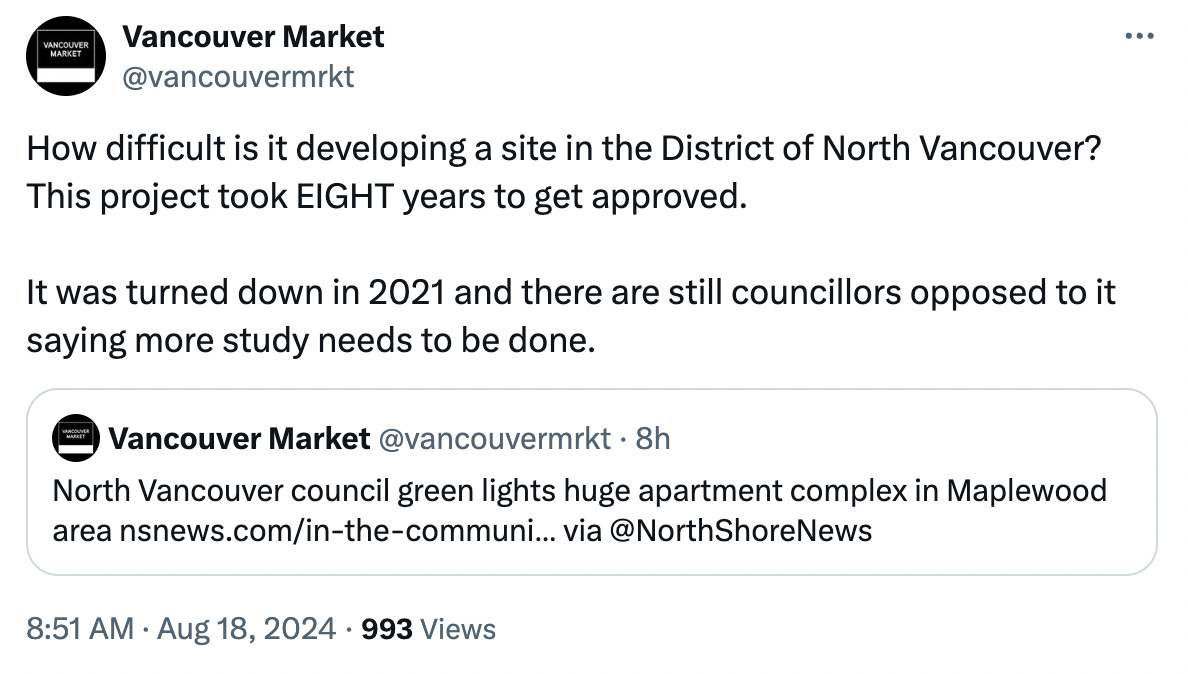Keeping the Lights On
Happy Monday Morning!
Big news on the housing supply front. Housing starts surprisingly rose to the highest level in more than a year. Construction was started on an annualized 279,509 units in July, according to CMHC. That’s the highest level since June 2023, and exceeded the 245,000 units expected by economists. Downturn? What downturn?
Per Bloomberg, “the data add to evidence of construction momentum picking up as borrowing costs start to fall, and amid billions in new loans and tax breaks from the federal government. Still, starts remain below 2021 and 2022 levels.”
Bloomberg reporters suggest construction momentum is picking up since the Bank of Canada started slashing rates in June, just two short months ago. If only developers could pivot so swiftly. The unfortunate reality is what quantifies as a housing start today is a reflection of the hard work put in years ago. From land acquisition, to architectural drawings and design, to permitting, and then pre-sales, the process takes 3-4 years just to become a housing start, and in some cases, like the 534 units just approved in North Vancouver, eight years!
Still, it makes for a convenient sound bite. Housing starts are up, the plan is working, only 4 million more homes to go by the year 2031.
Again, just to reiterate the ridiculousness of such a statement. A promise to build 4 million homes means you have to triple the record number of completions in a single year and you’d have to do it for six consecutive years. This comes at a time when the economy is already in a per capita recession, and new home sales in the GTA, our largest major metro, are currently sitting at 27 year lows!
There are several ingredients that go into a housing start. Not only are they the ones that we mentioned earlier, land acquisition, to architectural drawings and design, to permitting, and then pre-sales. The real kicker is pre-sales. On any condo project, lenders will typically want to see at least 60% of a building pre-sold in order to stroke a cheque to begin construction. If you can’t hit your pre-sale targets the project doesn’t get built, it’s that simple. So if pre-sales are at 27 year lows in the GTA, and 10 year lows in Vancouver, well, i’m afraid the writing is on the wall.
Policy makers are about to find out pre-sales lead housing starts.
This spells trouble for the construction sector, which currently employes nearly 9% of the workforce in Canada. According to the Globe & Mail, Canada is on track to reach about 240 real estate insolvencies this year, which would be 57% higher than 2023 and 13% higher than 2009, just after the GFC. This doesn’t include the number of developers and projects that have been forced into receivership for not paying their bills. So while housing starts are up, it’s a struggle just to keep the lights on.
We’ve had a long bull market amplified through zero interest rate policy, and we are now working through the hangover. Insolvencies are rising, and will continue to rise, despite more rate cuts from the Bank of Canada. Yes, housing starts are up, but that only tells us what happened, not where we are going. If anything, it only amplifies the concern that more of these housing starts will soon turn into housing completions, adding to the stock of condo inventory that is already piling up.
Some might call it a crisis, others would call it a real estate cycle. Eventually, this too shall pass.





Thanks for the perspective, Steve.
How do you think the type of 'unsellable condo' (i.e. perhaps more suited to AirBNB rather than long-term rental or owner live-in) has contributed to the drastic drop in condo sales? Is it fair to say that the prevalence of those types of condos is relatively new and therefore the current drop in sales may not 'fit' with what has historically been seen?
Is it possible for condo developers to build units that people actually want to buy, or is it Canadians that need to re-adjust their expectations and get comfy in their shoeboxes because it's the natural progression of our housing crisis?